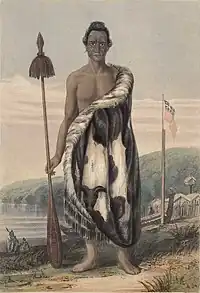Māori people
The Māori are the indigenous people of New Zealand. They were the first people to live in the islands.

The Polynesian ancestors of the Māori came to New Zealand between 800 and 1300 AD. There are many theories about where the Maori came from. They arrived from somewhere in tropical Polynesia, either from the Cook Islands or the Society Islands. There is also a widely-recognised theory that the Māori people originated from Vanuatu.[1]
Before Europeans came to New Zealand, the Māori did not need a name for themselves as a people. After Europeans came to New Zealand, the indigenous people called themselves Māori. Māori means "normal" or "ordinary". They called other people, especially those who came from Britain, “Pākehā”, meaning "white person". Today, in New Zealand English "Pākehā" is often used as a name for New Zealand Europeans.
Today, over 700,000 Māori people[2] live in New Zealand. They are an important part of the country's culture. This is why they have received special rights from the Government of New Zealand. Their native language, the Māori language, is an official language of the country along with English.
Related pages
References
- Roberts, Mere (April 1991). "Origin, Dispersal Routes, and Geographic Distribution of Rattus exulans, with Special Reference to New Zealand". Retrieved 26 November 2022.
- "Tāngata | Māori population | Stats NZ". www.stats.govt.nz. Retrieved 2022-09-09.